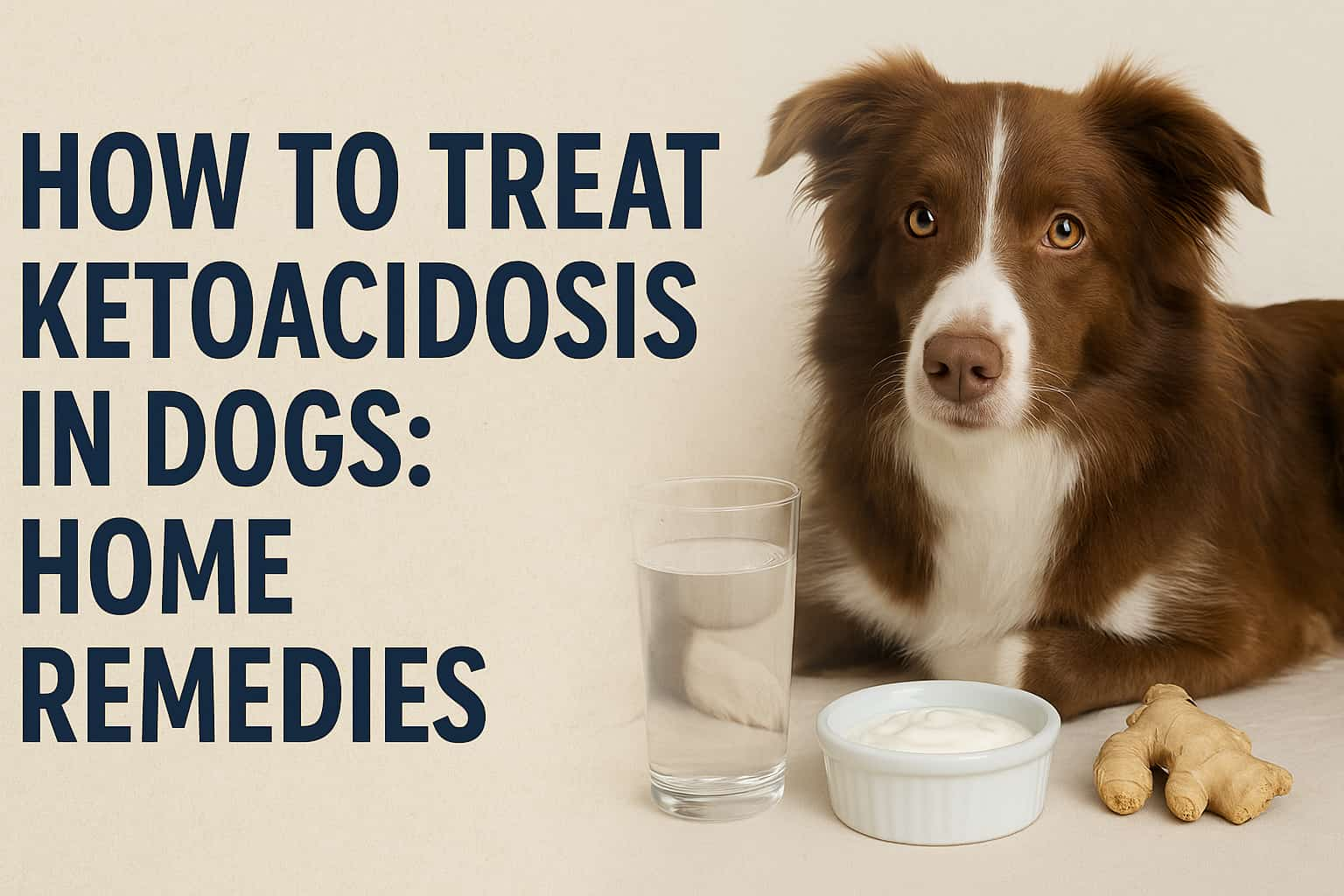Ketoacidosis in dogs is severe. It requires immediate attention.
Natural remedies can support traditional treatments and help manage symptoms at home. Understanding ketoacidosis is crucial for pet owners. It’s a condition in which a dog’s body produces excess ketones, which leads to dangerous acid levels. Symptoms include lethargy, vomiting, and rapid breathing.
While veterinary care is essential, home remedies can assist recovery. They offer comfort and support for healing. Natural treatments include dietary changes, hydration, and supplements. These can stabilize your dog’s condition. They promote well-being and ease symptoms. Knowledge about ketoacidosis helps in early detection. It empowers owners to act promptly. Your dog’s health is the priority. Learn how to care for them naturally. Discover ways to support their recovery at home.
Ketoacidosis In Dogs
Ketoacidosis is a serious condition in dogs. It happens when the body makes too many ketones, chemicals produced when it burns fat for energy. It can occur if a dog has diabetes. “Diabetic ketoacidosis (DKA) is a life-threatening complication of diabetes mellitus in dogs, characterized by hyperglycemia, ketonemia, and metabolic acidosis.”
— Merck Veterinary Manual – DKA in Dogs. Dogs may show signs like vomiting, tiredness, or drinking too much water. They might also have a fruity smell on their breath.
It is essential to watch for these signs. If you notice them, see a vet quickly. Early care can help your dog feel better and stay healthy. Keeping your dog’s diet balanced is key. It can help prevent this condition from starting.
Some dogs are more at risk for ketoacidosis. Dogs with diabetes are at higher risk. Overweight dogs can also face risks. Their body struggles with too much weight. Older dogs are more likely to develop this condition, too.
Having a healthy lifestyle helps. Good food and exercise are essential. Regular vet check-ups can spot problems early, preventing ketoacidosis in many cases. Keeping an eye on your dog’s health is crucial.

Initial Assessment
Dogs with ketoacidosis might look very tired. They may drink a lot of water. Frequent urination is another sign. Some dogs lose weight quickly. Vomiting can happen often. Their breath might have a fruity smell. Breathing could be fast or hard. If any of these signs are seen, act fast. A quick response can help the dog feel better.
Always talk to a veterinarian for help. They know how to treat ketoacidosis. They might suggest blood tests. These tests show how bad the problem is. The vet may give medicines to help. Always follow their advice. A vet can help find the best way to treat the dog. Proper care can make a big difference.
Dietary Adjustments
Dogs with ketoacidosis need a special diet. A low-carb diet is essential. “A low-carbohydrate diet may help minimize postprandial hyperglycemia in diabetic dogs and assist in stabilizing blood glucose levels.”
VCA Animal Hospitals—Nutrition and Diabetes. Carbohydrates can increase sugar levels, which is unsuitable for dogs with this condition. Choose foods that are low in carbohydrates. Fresh meat and fish are great choices. Always include some vegetables, but avoid starchy ones like potatoes.
Hydration is crucial for dogs with ketoacidosis. Water helps flush out toxins. Ensure your dog drinks plenty of water. You can also give them low-sodium broth, which can help keep them hydrated. Avoid sugary drinks or juices, which can worsen their condition. Always have clean water available for them.
Natural Supplements
Herbs can help a dog with ketoacidosis. Milk thistle helps the liver, and dandelion root aids digestion. “Milk thistle (Silybum marianum) is known for its hepatoprotective effects and may support liver function in dogs undergoing treatment for metabolic disorders.”
— National Library of Medicine – Milk Thistle in Veterinary Use. Both herbs are natural and safe. Burdock root cleans the blood, and turmeric reduces inflammation. These herbs support a dog’s health.
Vitamin C boosts the immune system. Magnesium helps energy levels. Potassium keeps the heart strong. Zinc supports healing. Calcium strengthens bones. Iron is essential for blood health. Dogs need these vitamins and minerals. They keep dogs healthy and strong.
Monitoring Blood Sugar
Checking your dog’s blood sugar is very important. “Frequent glucose monitoring is critical in managing canine diabetes and detecting the onset of DKA early.”
— American College of Veterinary Internal Medicine (ACVIM) Guidelines. A glucose meter helps with this task. It shows the sugar levels quickly. You must prick a small spot on the dog’s ear or paw. This spot gives a tiny blood drop. The meter reads the blood and tells the sugar level. It is a quick and straightforward process.
Check your dog’s sugar three to four times a day. Morning checks are essential. Another check before meals is good. Always check sugar before bedtime, too. Keeping a record helps track changes, which can help adjust the dog’s diet or treatment.

Exercise And Activity
Keep exercise short and gentle for your dog. Start with slow walks in the garden. Avoid strenuous activities like jumping or running. Use a soft leash for safety. Always watch your dog’s energy levels. Dogs should not look tired or stressed. Give plenty of water breaks. Keep the dog hydrated and comfortable. Dogs need rest after exercise.
Physical activity helps dogs feel better. “Moderate physical activity supports glucose metabolism and helps improve insulin sensitivity in diabetic dogs.”
Frontiers in Veterinary Science—Exercise and Metabolism in Dogs. Exercise keeps dogs active and happy, giving them more energy and better health. It helps dogs digest food properly and keeps their hearts healthy. Dogs sleep better after exercise and feel calm and relaxed. Regular activity boosts their immune system, making them stronger and more resilient.
Stress Management
Creating a Calm Environment is essential for dogs with ketoacidosis. Keep noise levels low at home. “Reducing stress and maintaining a consistent routine can positively impact glycemic control in diabetic pets.”
— PetMD – Stress and Blood Sugar in Diabetic Dogs. Soft music can help soothe your dog. Speak gently and kindly to your dog. Avoid sudden movements that might scare them. Comfortable beds can help your dog relax. Provide a quiet space where they feel safe. Ensure the room is warm but not too hot.
Behavioral Techniques can support stress management. Regular walks can calm your dog. Play gentle games to keep them happy. Avoid rough play that might stress them. Teach simple commands like sit and stay. Praise your dog when they follow commands. This builds their confidence. Interactive toys can help distract them. Spend time with your dog every day. Your presence comforts them.
Emergency Protocols
Dogs with ketoacidosis might feel very tired. They could also vomit a lot. Breathing might become fast and deep. You might see a fruity breath smell. Confusion or stumbling can happen, too. These are signs of severe problems.
Call a vet if your dog is in pain. High fever needs fast attention, and uncontrolled shaking is not normal. Don’t wait if your dog collapses. These symptoms can be dangerous. Always ensure your dog’s safety first.
Frequently Asked Questions
Can Ketoacidosis In Dogs Be Treated At Home?
Treating ketoacidosis in dogs at home is not recommended. Seek immediate veterinary care for proper diagnosis and treatment. Delays can lead to severe complications. Follow the vet’s instructions for the best outcomes. Regular monitoring and professional guidance are crucial for managing this condition effectively.
How To Reverse DKA at Home?
Seek immediate medical attention for DKA. Monitor blood sugar closely at home, stay hydrated, and follow the doctor’s advice.
What Stops Ketoacidosis?
Insulin therapy effectively stops ketoacidosis by regulating blood sugar and ketone levels. Proper hydration and electrolyte balance also aid recovery. Regular monitoring of blood glucose levels prevents complications. Seek medical advice promptly for tailored treatment.
Does Drinking Water Help DKA?
Drinking water can help manage dehydration in DKA. Always seek immediate medical attention for proper treatment. Hydration supports recovery but doesn’t replace medical care.
Conclusion
Caring for a dog with ketoacidosis at home requires patience and love. Simple, natural remedies can help manage symptoms. Ensure your dog stays hydrated. Provide a balanced, nutritious diet. Regularly check their blood sugar levels. Always keep your vet informed of any changes.
Natural approaches should complement, not replace, professional veterinary care. Remember, your dog’s health is the priority. With the proper care, they can feel better at home. Always be attentive to their needs and watch for any warning signs. Your efforts can make a significant difference in their recovery.
References
- Merck Veterinary Manual.
Diabetic Ketoacidosis in Animals
➤ https://www.merckvetmanual.com/endocrine-system/diabetes-mellitus/diabetic-ketoacidosis-in-animals - VCA Animal Hospitals.
Diabetes Mellitus in Dogs
➤ https://vcahospitals.com/know-your-pet/diabetes-mellitus-in-dogs - National Institutes of Health (NIH).
Milk Thistle in Liver Disease: A Summary of Research
➤ https://www.ncbi.nlm.nih.gov/pmc/articles/PMC5664023/ - American College of Veterinary Internal Medicine (ACVIM).
Consensus Statement on Diabetes Mellitus in Dogs
➤ https://onlinelibrary.wiley.com/doi/full/10.1111/jvim.15736 - Frontiers in Veterinary Science.
Exercise and Metabolic Regulation in Dogs
➤ https://www.frontiersin.org/articles/10.3389/fvets.2021.644152/full - PetMD.
How Stress Affects Blood Sugar in Diabetic Dogs
➤ https://www.petmd.com/dog/diabetes/how-stress-affects-blood-sugar-dogs
🩺 Reviewed by Dr. Audrey Cook, BVM&S, DACVIM-SAIM, DECVIM-CA
Professor of Small Animal Internal Medicine
Texas A&M University, College of Veterinary Medicine
Dr. Audrey Cook is a globally recognized expert in veterinary endocrinology. With certifications in both U.S. and European veterinary medicine, she specializes in feline diabetes, insulin therapies, and chronic endocrine disorders. Her work influences best practices in clinics worldwide.






